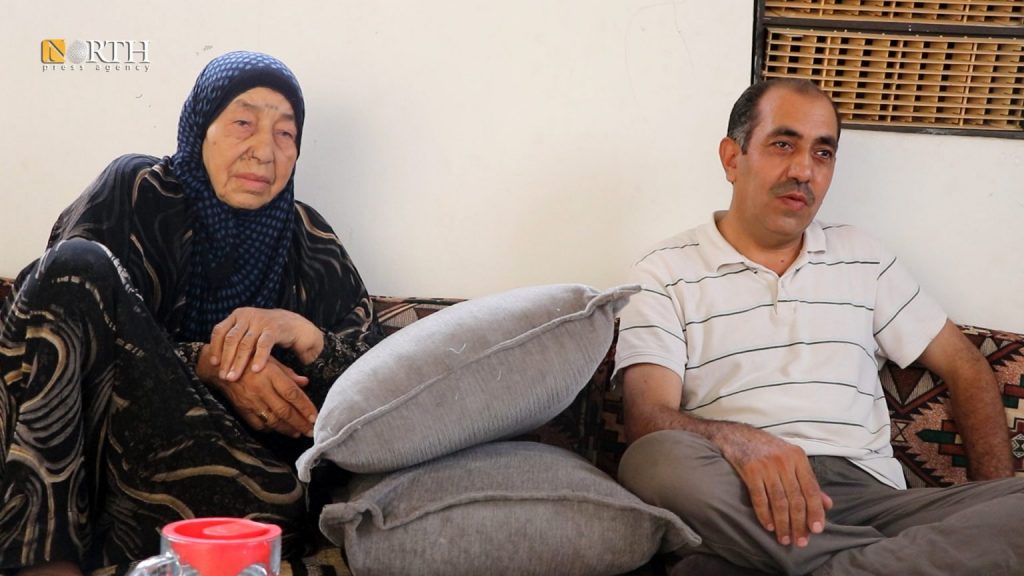JIL AGHA, Syria (North Press) – 40-year-old Abdulsalam Hasani travels every day in the streets of Jil Agha, east of Qamishli, smiling at the faces of the passersby.
The man, who has Down Syndrome replies to people who invite him to sit with his famous phrase, “My daughter is waiting for me.”
Hasani has three academically successful daughters: 14-year-old Maya, 12-year-old Saada, and nine-year-old Shahed.
One in 1000 children is born with Down Syndrome, according to the US National Association for Down Syndrome.
Down syndrome is a condition in which a person is born with an extra chromosome. It can cause learning disabilities in children and changes in growth and physical features, according to the Mayo Clinic.
When I will get married?
Hasani’s 70-year-old mother, Arina Khalaf, described the moment when her son wanted to get married. “I was shocked then; his request was painful and hard, because my son was my weak point and my source of power at the same time.”
Khalaf searched for a bride, and she found him a girl with a disability, but only after she asked doctors whether her son’s disability would allow him to get married or not.
Nevertheless, Hasani got married and had his first daughter Maya.
Additionally, Khalaf describes her happiness over the birth of Maya: “It was an unforgettable day. Even the day I gave birth to my twins, Abdulsalam and Muwaffaq, I did not rejoice like this.”
Sabah Abdulrahman, a psychological consultant, says that people with Down Syndrome are physically able to get married and give birth, “but they are unable to take care and raise their children, so the individuals’ families should be responsible for the children.”
Arina does not complain about the extra burdens of taking care of Abdulsalam and his family; on the contrary, she takes care of his three daughters who fill the house with happiness.”
Muwaffaq, Abdulsalam’s twin brother, works in the Rimelan Fuel Company and other professions in order to provide his brother’s family with their daily needs.
Abdulsalam advised his brother to give up smoking, something which upset Muwaffaq.

Facing bullying
Muwaffaq complains about the bullying he faces, saying, “I do not blame my brother, rather I blame the people and society that do not appreciate and respect the family’s idiosyncrasies.”
Arina says that “’idiot’, ‘Abu Barake,’ (Father of a ‘blessing’) and ‘mad’ are words that people should forget; no one gives up his children to please people.”
Sabah Abdulrahman considers this social phenomenon as “common in a society that rejects those people as our partners in life.”
Abdulrahaman, who runs the psychological counselling center in Girke Lege, believes that “society looks with pity at the family with a Down Syndrome child, and it may even affect female marriage.”
Regarding bullying, Abdulsalam’s daughters are the most affected ones.
Shahed, who is in fourth grade, replies to people’s bullying, saying, “He is my father, and I am not ashamed of that; we live for the sake of him and my mother.”
This powerful phrase was a result of the feelings of normalcy that their grandmother provided to them, which made the girl say it with confidence to ease the impacts of bullying.
Shahed adds, teary-eyed, “I feel sad for people’s comments regarding my father.”
“It is harsh to be in your father’s place; my sister and I feel that we are responsible for our parents, and we should take care of them as if they were children,” she concluded.
Lack of care centers
There is a lack of centers and schools for people with Down Syndrome in northeast Syria.
The only center that receives those with Down Syndrome is the Hevi Center in Girke Lege where specialists take care of people according to their classification of the level of care required, which include three levels.
They classify the level according to physical features as well as international intelligence tests, according to Sabah Abdulrahman.
Many families do not recognize the important improvement that those with Down Syndrome may achieve if they join special care centers and are well taken care of.
Family awareness and care play an important role in improving their children with the syndrome, according to many medical and psychological sources.
Abdulrahman says, “War has a bad psychological impact on [those without disabilities], so how those with special disabilities like Abdulsalam will not be affected? It is natural that they have double sufferings.”

